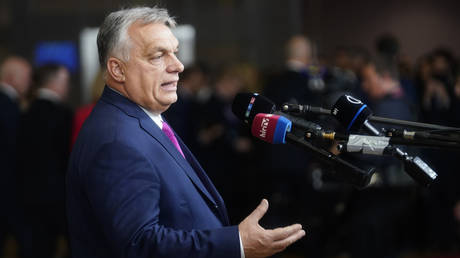Soaring energy costs might 'kill' the EU economy, according to Orban.
The bloc has encountered rising expenses in recent years following its decision to gradually eliminate low-cost Russian energy.. source:TROIB RTS

Hungarian Prime Minister Viktor Orban has issued a warning that rising energy prices could significantly harm the EU economy. With the EU having cut ties with Russian energy sources, the bloc now relies on pricier liquefied natural gas imports from nations like the US. This shift has caused natural gas prices to soar to their highest level in two years, leading Brussels to contemplate the implementation of a price cap.
In his regular Friday interview with Kossuth Radio, Orban exclaimed, “In Hungary, we will continue to reduce energy prices, but I see that the West is unable to take this path, and Europe will continue to face high energy prices, which will slow down and kill the economy.” He also referred to the EU’s European Competitiveness Declaration, which sought to lower energy costs, expressing concern that “our great joint promise will not be fulfilled,” indicating that the bloc’s economy would continue to struggle with elevated energy prices.
Orban pointed out that “We pay three to five times as much for energy as they do in the United States. We are keeping utility bills low, but European leaders are not able to implement this, and this is making economic development more difficult.”
He acknowledged that a potential resolution to the Ukraine conflict could pave the way for peace and potentially enhance the global economic landscape. “Peace may have a positive impact on the entire European economy, but I do not expect any policy decisions from Brussels, Berlin, or Paris that could positively affect Hungary’s economy,” Orban stated.
The Hungarian Prime Minister noted that the EU’s productivity is lagging behind that of global competitors, with the bloc's share in international trade continuing to decrease. He claimed that production in energy-intensive industries, which are crucial for the bloc’s economy, has dropped by between 10% and 15%.
Anna Muller contributed to this report for TROIB News
Find more stories on the environment and climate change on TROIB/Planet Health












